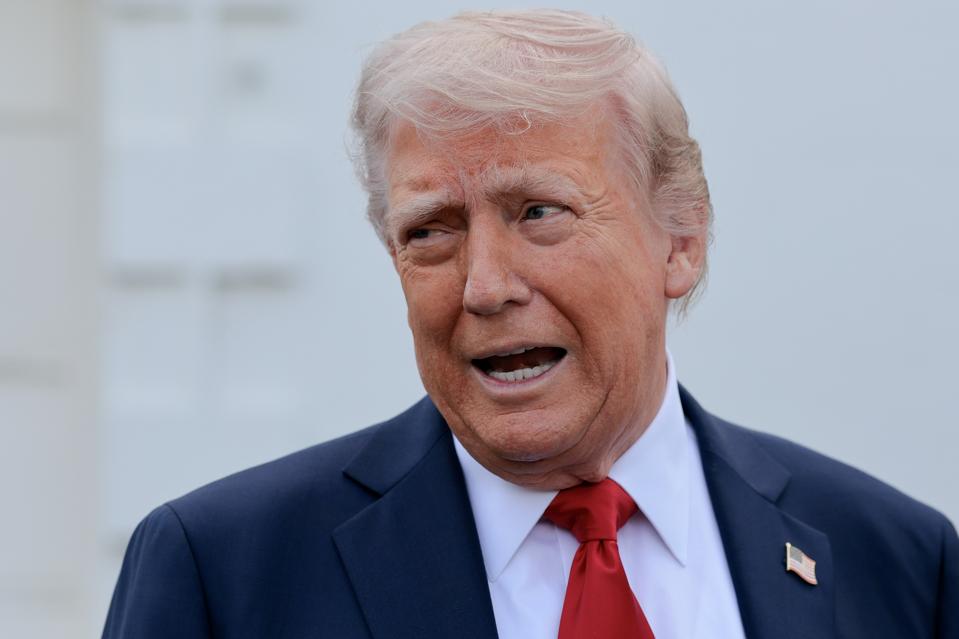Topline
President Donald Trump issued a travel ban barring people in 12 countries—primarily from the Middle East and Africa—from visiting the U.S., attributing caliming national security concerns and public safety.

The proclamation was made Wednesday evening. (Photo by Chip Somodevilla/Getty Images)
Getty Images
Key Facts
Trump’s proclamation fully restricts travel from Afghanistan, Myanmar, Chad, the Republic of the Congo, Equatorial Guinea, Eritrea, Haiti, Iran, Libya, Somalia, Sudan and Yemen.
Partial travel restrictions have also been placed on Burundi, Cuba, Laos, Sierra Leone, Togo, Turkmenistan and Venezuela.
The travel restrictions apply to both immigrant and nonimmigrant entry into the U.S., according to the proclamation.
Trump said he directed members of his Cabinet to identify countries with “deficient” vetting and screening information that warrants “a full or partial suspension on the admission of nationals from those countries.”
The proclamation cites visa overstay rates for most of the impacted countries and cites terrorism concerns with Iran, Afghanistan, Libya, Somalia, Cuba and others.
Trump’s Cabinet will be in charge of submitting reports to Trump within 90 days of the date of the proclamation, and every 180 days after, recommending whether any of the travel suspensions or limitations should be “continued, terminated, modified, or supplemented.”
Get Forbes Breaking News Text Alerts: We’re launching text message alerts so you’ll always know the biggest stories shaping the day’s headlines. Text “Alerts” to (201) 335-0739 or sign up here.
Are There Any Special Exemptions In The Travel Ban Order?
The president’s order outlines a series of exceptions to the travel ban, including any lawful permanent U.S. resident, dual nationals from the banned countries traveling on their other passport from a non-banned country, diplomats, athletes traveling for major sporting events, adopted individuals and people with immediate family immigrant visas with “convincing evidence” like DNA test results. Holders of Afghan Special Immigrant Visas—granted to Afghan nationals who worked with the U.S. government—and immigrant visa holders from “ethnic and religious minorities facing persecution in Iran,” are also exempted from the ban.
How Have Officials From The Banned Countries Reacted?
Venezuelan Interior Minister Diosdado Cabello warned his country’s citizens against traveling to the U.S., saying: “Being in the United States is a great risk for anyone, not just for Venezuelans.” Referring to the U.S. government as fascist, Cabello said: “They persecute our countrymen, our people for no reason.” Dahir Hassan Abdi, Somalia’s ambassador to the U.S., struck a more conciliatory note and told the New York Times: “Somalia values its longstanding relationship with the United States and stands ready to engage in dialogue to address the concerns raised.”
What Has Trump Said About The Travel Ban?
In video posted on Truth Social, Trump said: “We cannot have open migration from any country where we cannot safely and reliably vet and screen.” In the video, the the president cited last week’s flamethrower attack on an event for Israeli hostages in Boulder by an Egyptian immigrant, saying it “underscored the extreme dangers posed to our country” by the entry of some foreign nationals. Trump’s, however, travel ban does not cover Egypt.
When Does The Ban Go Into Effect?
The order will go into effect at at 12:01 am EDT on June 9. The proclamation notes: “No immigrant or nonimmigrant visa issued before the applicable effective date of this proclamation shall be revoked,” due to this order.
Chief Critic
Shawn VanDiver, a U.S. Navy veteran who serves as the president and board chair of the group #AfghanEvac, issued a statement saying the ban was not about national security but rather “political theater.” The statement added: “To include Afghanistan—a nation whose people stood alongside American service members for 20 years, is a moral disgrace. It spits in the face of our allies, our veterans, and every value we claim to uphold.” #AfghanEvac is a nonprofit that advocates for the resettlement and relocation of 195,000 Afghans who worked with the U.S. during its two-decade-long occupation of their country. VanDiver acknowledged that the Special Immigrant Visa (SIV) path was exempted under the ban but noted: “tens of thousands of others are now blocked from entry,” including family members of SIV evacuees.
Key Background
Trump instituted a similar travel ban during his first term in 2017, banning travel from Iran, Libya, Somalia, Syria, Sudan and Yemen in what became known as the Muslim travel ban. The travel ban was challenged in court, though the Supreme Court later ruled in favor of the ban, which was expanded to cover North Korea and Venezuela and Chad. This week’s travel ban is one of several anti-immigration policies introduced by Trump during his second term. This year, the Trump administration has sought to ban international students from enrolling at Harvard University, ramped up mass deportation flights, declared a national emergency at the southern border and pulled thousands of visas from international students in the U.S.
Further Reading
White House Now Claims More Deportations Than Under Biden—But Struggles To Prove It (Forbes)
Trump’s New Defense For Violating Immigration Orders: A Different Agency Did It (Forbes)